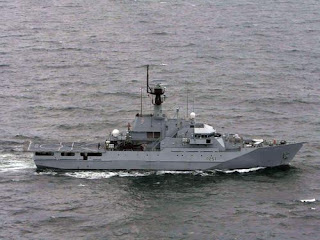"DESIRE THE RIGHT"
Port Stanley, capital of the Falkland Islands looks like a typical sleepy seaside town off the coast of Southern England. It is however in the middle of the South Atlantic.
If I ever became wealthy, (halevai!) this is one of the places I'd love to visit.
Typical English house.
A Land Rover outside every home.
A farm in Scotland West Falkland
Back in March 2010 when Britain began drilling for oil in the waters off the Falkland Islands, Argentina began a renewed military and diplomatic campaign to recapture these islands and its resources. With a potential to yield up to 1.7 billion barrels from these deposits I'm not surprised.
Britain has 1,000 soldiers on the islands although most of them are non combat troops. They also had, for many years, a single Royal Navy ship; the HMS Clyde on permanent station.
Argentinean harassment of Falkland islander's boats has increased and the Argentinean government has threatened to intercept any ships entering what they consider their sovereign waters in order to service Britain's oil project.
Due to Falkland Islanders' justifiable fears as well as questions in Parliament, the government announced that it was sending the destroyer HMS York and a supply tanker but due to other naval responsibilities, this was all they could spare.
HMS York is an old Type 42 destroyer, the same type as the ones that fought in the Falkland's war in 1982. It was a Type 42 destroyer, HMS Sheffield which was sunk by an Exocet missile during that war to liberate the Islands.
This is the response of Her Majesty's government not only despite the renewed Argentinean threats but also despite, what I would have thought would be the added incentive to protect a potentially very lucrative oil deposit. The response is apparently the best that Britain can afford.
I mention this, not only because I believe that Britain should do far more to protect its sovereignty in and around the Falkland Islands and that I think it is a grave mistake that Britian has reduced the effectiveness of its Royal Navy to a fraction of what is needed, through decades of budget cuts, but also to explain my puzzlement regarding the British government's offer yesterday to relieve Israel of the responsibility of overseeing of materials entering Gaza from the sea.
Exactly what will Her Majesty's government have available to guard the waters of Gaza against the next attempt to bring missiles and other lethal weapons into Hamasland?
Maybe a rubber dinghy? That will scare off the Iranian ships I don't think!










2 comments:
It's true the Type 42 frigate is an ageing platform that was supposed to have been retired, several years ago, to make way for the new Type 45 destroyer; but that project, as well as other new replacements for the surface fleet, is well behind schedule. Nevertheless, Types 42 and 23 have undergone a series of major upgrades to command & control systems, as well as the close-in, and point defence battles systems. There has been superstructure redesign as well, to limit and contain missile strike damage. The Excocet incident happened because Sheffield's in-coming missile surveillance and detection radar system was temporarily turned off because it was interfering with anti-submarine helicopter communications Otherwise, the Goalkeeper CWIS would have automatically responded to the threat and probably have intercepted the missile (even sea-skimming varieties such as Excocet). A similar incident occurred a couple of years ago with the Israeli Sa'ar 5 when it was hit by a Hamas missile, after the threat surveillance and detection radar was turned off during helicopter ops. RN fighting doctrine and capability is still pretty impressive, but has been hamstrung owing to budget cuts.
Thanks Anonymous for setting the record straight. And here was me thinking that they had to switch off the radar system everytime they put the kettle on.
Post a Comment